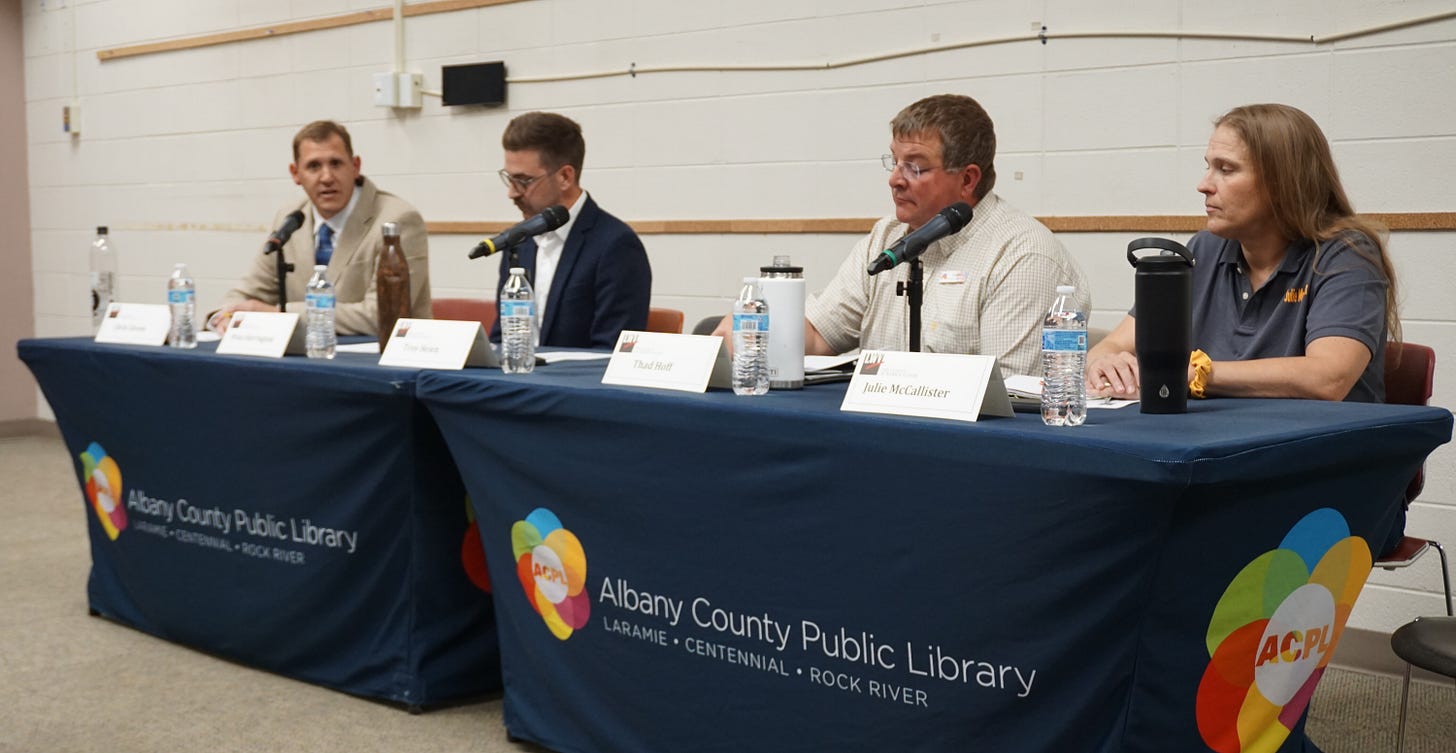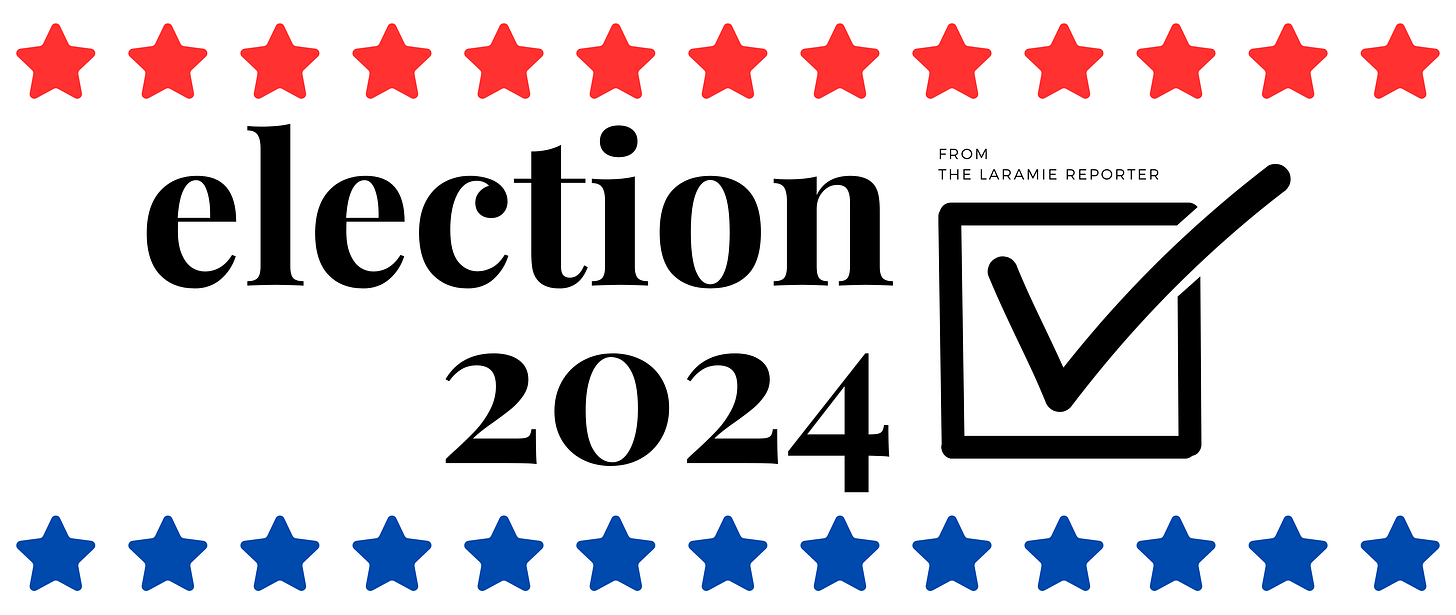Four candidates are seeking GOP nomination in the race for an open county commission seat
In this year’s most crowded local primary, four Republicans — Cleven, Hoff, McCallister and Heien — are competing for their party’s nomination and a chance at joining the Albany County Commission.
This year’s Albany County Commission race — a competition for one open seat on the three-member body — will determine which party leads county government in the coming years.
The other seats — the two not up for grabs this year — are split between one Republican and one Democrat, so the winner of 2024’s race will tip the balance in favor of their party. That will likely have significant ramifications for aquifer protection, private property issues, and the level of coordination residents see between the city and the county.
While the Democrats have landed on a presumptive nominee — current Laramie Mayor Brian Harrington, who is running unopposed in his own primary — Republicans have a choice to make.
In a year when so many other local races have no meaningful primary competition, four Republicans will appear on their party’s primary ballots in August, each seeking the opportunity to take on Harrington in the General Election.
In alphabetical order, those candidates are:
Chris Cleven, a Laramie Police Department officer with 16 years behind the badge who has not sought political office before. Cleven has put an emphasis on balancing budgets and improving road and highway safety while promising to advocate for “smaller, more efficient government.”
Troy Heien, a business owner and landlord whose public statements have been light on specifics, but stress his support for the second amendment and private property rights, as well as his belief that government action should be based on “the rule of law, God’s Law, and the Constitution.”
Thad Hoff, a locksmith and the owner of Wyoming State Safe & Lock Company, who sought a seat on the county commission in 2018, but placed third in the Republican primary. Hoff has put an emphasis on economic development and the infrastructure build-out necessary for such development.
Julie McCallister, a Rock River resident and perennial candidate in State House elections trying her hand, for the first time, at the county level. McCallister has stressed the importance of roads and fiscal responsibility, while advocating for better, more open communication.

Albany County Commission Candidate Questionnaire
Three of the four Republican candidates in this year’s race filled out a questionnaire for the Laramie Reporter, sharing their thoughts of the issues facing Albany County.
Candidates were allowed (a lightly enforced) 100-word response to the questions below. Answers which exceeded that limit by a wide margin were abridged.
Commission candidates have additionally shared their views during a Progressive Voter Alliance meeting hosted in June and a League of Women Voters forum also in June and have answered questions for Vote411.org. Troy Heien did not respond to emails from the Laramie Reporter. He did not attend the PVA meeting or the LWV forum.
In your view, what are the most important issues facing the county today?
CHRIS CLEVEN: I think it will prob come down to planning and zoning, water access for rural residents west and north of town as well as road safety. We all have heard of too many accidents and fatalities on our community roads. We need to work with the state to see how to both improve our county roads as well as safety on the highways we all travel.
THAD HOFF: As always funding is at the top of the list, both for operations and spending on special interests that benefit the community. Economic development would be another. The county is behind in cultivating business and support structure for potential incoming businesses. The last issue is property tax relief and how that affects future budgeting and long-term planning.
JULIE McCALLISTER: The issues of highest priority for me are roads, access and maintenance. Sustainable long term property tax reduction, with more fiscal transparency. Proper implementation of budgeting in every aspect, and sustainable growth.
What does the county do well? What should it improve upon?
CLEVEN: I believe the county has done a lot of things right. They prioritize road maintenance which benefits the majority of the citizens as well as essential services including Police, Fire and Rescue and for the most part, they stay out of citizens’ lives. As for improvement, I would say to remember they are citizens too, they are elected as representatives.
HOFF: Stretching a dollar. The county has always made what was available count. Essential services are always available, the courthouse remains open for business, the rural fire departments respond to calls, and [Albany County] Road and Bridge keep the roads passable.
McCALLISTER: The county has done a good job on many items, including but not limited to: protecting the Casper Aquifer, most road maintenance and access, but this is also an area that the county can improve, the issue with Boswell road being of paramount importance. The county needs to do a better job at getting the community involved in meetings, and getting public input. The county needs to move to fiscal independence.
Recent action by the legislature provided property tax relief for some Wyoming homeowners. This could help those struggling to pay rising taxes but could also hurt the counties and schools that rely on that tax base. What are your thoughts about the recent property tax relief and how should the county manage any decrease to its coffers?
CLEVEN: There are two parts to this, first with what was signed into law, then the second coming up, is based on the signatures collected this last year. With the first legislation that was passed recently, I think it is more of a ‘Let’s see what this actually does and how are all the counties going to handle this.’ As it’s set to sunset in 2027, it is very mild and only has fairly strict exemptions. Now the upcoming proposed legislation, if placed on the [ballot] and passed by voters in the 2026 election, will be hard on local governments. But, could it also be the catalyst for us to reign in government spending, requiring us to work within our budgets, like all American families?
HOFF: It is going to hurt the county, no doubt, I would have supported some kind of percentage reduction on a schedule to give more time for fiscal planning. As an aside, it is an irritation that veterans must request property tax relief annually to receive their exemption. I am optimistic that exploration of rare earth mineral deposits could aid in alleviating some of the property tax deficit.
McCALLISTER: I was pleased with what property tax relief was passed, although I do feel it was lacking and had hoped for more relief to be passed. For the budget reduction, I would identify any areas of excessive spending and eliminate them. Also, all future budget increases need to be carefully scrutinized to ensure that the budget is sustainable while giving the needed tax relief to constituents. Budget reduction can be accomplished by going over the budget [by] line item, and reducing wherever possible.
Are there any significant changes you would like to make to the county budget?
CLEVEN: I would need to get a full picture of the expenses and where the citizens’ funds are going. Most people don’t realize that elected officials manage their budgets according to their needs. Yes, the County Commissioners accept the budgets proposed or request county-wide changes, but my goal would be to look at the funds used and weigh them against the general public benefit. Remember it’s their tax dollars.
HOFF: Not right now or not yet. Demands change from year to year. It will become increasingly important for department heads and elected officials to be heard with their recommendations as to budget needs. I do not have a crystal ball, but I am willing to listen.
McCALLISTER: At this time I have not identified any areas in need of immediate cuts. But I look forward to being able to identify areas where the County can save funding, or increase efficiency. Taking advantage of grants that are available is a great idea, but grants are temporary. The County has a responsibility to move to sustainable independent funding at every opportunity.
Do you feel the Casper Aquifer is adequately protected? Should there be more or fewer regulations regarding what can be built on the land above it?
CLEVEN: Yes, I feel that the Casper Aquifer is adequately protected. You prob won’t get a straightforward answer like that from most candidates. Far too often decisions are made from emotions that over-regulate and take rights away. We need to fully evaluate all aspects and develop regulations that are both considerate of residential landowner needs, yet still have robust protections for the future of our community.
HOFF: I should hope that after all the research and consulting expenditures that the Casper Aquifer is all but sealed up tight. However, it seems that over the years adjusting the boundaries and surface regulations has become gerrymandering at its finest. I feel like some of the changes made to the zone have been political and not based entirely on testing or science.
McCALLISTER: At this time, I do, but this is an area where input and monitoring of the situation are critical to maintaining this level of effective protection. It is also important to remember that the water in the Casper Aquifer belongs to the State of Wyoming, not the County or City. The [Aquifer] will need to be monitored for quality, usage and appropriate regulations over time as future needs develop. As it sits I think the protections are adequate. But this in no way means that keeping this issue on the radar is any less essential. Needs and proposals are going to change over time, presenting a constant need to review and update if needed to these protections.

Should the county pursue renewable energy and seek to reduce greenhouse gas emissions when it comes to its own operations and buildings?
CLEVEN: Yes, I believe the county owes it to the citizens to evaluate the cost of every building, for both upkeep as well as utilities. By reviewing the return on investment for renewable energy, the county will have a full picture of the utilities used and ways to cut costs, saving the citizens funds to use for roads or reduce taxes. I don’t mind green energy, but you also have to evaluate the return on investment.
HOFF: The county can and should consider ways to correct inefficiencies in its buildings and operations. Even minor changes that can increase efficiencies would be helpful at reducing any environmental impact, with a bonus, decrease in operating costs.
McCALLISTER: If there are opportunities in which the County is able to take advantage of a zero emission or solar renewable energy for its own buildings, this should be considered. I do not feel that the county is in a current position to be considering any capital or major construction projects at this time. My goals include maintaining all property tax reductions, so I do not see a time in the immediate future where this is a viable option. But, if this changes, yes I would consider these options, especially if savings of monies to the county can be guaranteed over time.
Should the county encourage or support wind and solar development?
CLEVEN: I believe my previous answer is sufficient on this one, to sum it up, you have to look at the return on investment. But in the end, the property owners are the real winners, that decision has to be up to them.
HOFF: To an extent, I can support both wind and solar with a large hesitation for wind generating equipment. It historically has taken about 10 years to generate enough energy to offset the cost. Ironically, that same equipment usually requires an overhaul or replacement at about that same interval. I see wind providing jobs at the local level and not much more. Solar is fine for household energy but becomes problematic for energy storage and transmission for peak demand times.
McCALLISTER: Where opportunities exist for the County to encourage or support solar and wind development, and the financials of the project are sound yes. But not every project is going to be a good fit for the county’s needs, and budget. So each of these opportunities needs to be vetted for those concerns, and others, prior.
Albany County Commission meetings are not well attended. How would you ensure that the county government is being transparent and communicating with the public?
CLEVEN: This one is tough, I like most people, am very busy, and with a family of 5 kids, participating in 4H, sports and fundraisers, there is not much time for more. People will come to meetings or participate when it means something to them. I think the biggest issue is getting information out there for people to be aware of so that it means something to them. Getting to hear their voice is so incredibly important. I would just about refuse to go into executive session unless required by law. These are the times when discussions do not have any accountability.
HOFF: Paying bills, approving correspondence, and voting to approve the minutes is never going to draw a crowd. What is important is making sure that information isn’t kept from the public. The commission isn’t in place to keep secrets from residents but act in the best interest of all residents. Full disclosure and forewarning to the public is the only way to achieve this. What medium is the best seems to slowly change and I don’t know what is best at this moment.
McCALLISTER: This is a very high priority for me. In order for the county commission to be able to perform at the highest level possible the maximization of public involvement needs to be a priority. Albany County is diverse, in economy, needs, and people. In order to respect this public involvement and respect of the differences in the county are paramount. The public needs to know that the commission is being receptive and reactive to their needs, concerns and thoughts. Community connection will be one of my highest priorities if elected.
How closely should the county collaborate with the city of Laramie?
CLEVEN: I do believe the City and the County need to work together, the city is in the county and even though there is home rule, we are all citizens of this county. Citizens in the county come into the city for the amenities, and citizens in the city go to the county for recreation, relaxation and enjoyment of our public lands. There has to be cooperation, anyone who [says] otherwise is lying and has a personal agenda. The city needs to be respectful of county residents and their property rights while the county understands the needs of the city for ongoing growth, development and enjoyment.
HOFF: There will always be a relationship that exists between both government bodies. A collaboration would imply that what has happened is beneficial to both bodies. As a commissioner we need to reevaluate previous agreements to ensure that both parties are still benefiting from previous collaborations. And if not make some tough decisions to amend or terminate.
McCALLISTER: Only to the degree that is absolutely necessary. While it is undeniable that in some ways the county and the city will have overlapping interests in the same issues, they are separate forms and functions of government for a reason. The County interests are much more diverse and broad than the city’s interests by simple fact. Collaboration is necessary but should be minimized in order for both governments to function to the best of their ability. To not clearly identify that the County and City have different needs, functions and focus would be a serious disservice to the public.
Finally, a big picture question: What is the appropriate role of government?
CLEVEN: Keeping in mind this is not a question about County Commissioner specific, the primary role of government is to protect the inherent rights of individuals as outlined in the Constitution, including rights to life, liberty, and property. This involves ensuring law and order, safeguarding freedoms of speech, religion, and assembly, and protecting citizens from harm. Additionally, they should promote free market and economic stability, limit government intervention all while observing fiscal responsibility.
HOFF: Govern for the people not govern the people. Government at any level should serve those who established, voted, supported, and participated in its creation and continued operation of it. National government scrutiny and reporting seems to garner the most attention. At the same time local government handles the meat and potatoes of day to day living and with a larger impact to the average citizen.
McCALLISTER: To protect life, liberty, and the pursuit of happiness, with the least amount of regulation, interference and restrictions as possible in every aspect.
Correction: An earlier version of this story gave the wrong URL for Vote411.org. That URL has been updated. The hyperlink over that text was, and remains, correct.




